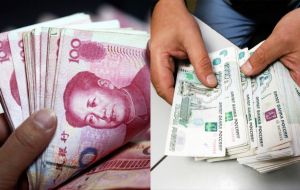MercoPress. South Atlantic News Agency
US dollar set aside - China, Russia trade in local currencies
 Chinese yuans and Russians rubles as new financial tools for international trade
Chinese yuans and Russians rubles as new financial tools for international trade New financial tools come into force as buffer against vulnerability to exchange rate fluctuations.
China and Russia have effectively switched to domestic currencies in trading using financial tools as swaps and forwards, as they seek to reduce the influence of the US dollar and foreign exchange risks.
The agreement signed in the end of October came into force Monday, December 29, and provides a currency swap of CNY150 billion (up to US$25 billion).
The Foreign Exchange Trade System will carry out similar transactions with the Malaysian ringgit and the New Zealand dollar. From now on yuan swaps are available for 11 currencies on the foreign exchange market.
“China won’t stop yuan globalization or capital account opening because of the volatility in emerging market currencies,” Ju Wang, a senior currency strategist at HSBC Holdings Plc in Hong Kong told Bloomberg.
China has set up bilateral currency swap lines with more than 20 countries and regions since 2009, including Switzerland, Brazil, Hong Kong, Indonesia and South Korea, Xinhua News reported in July.
A swap is a financial tool to ease transactions by exchanging certain elements of a loan in one currency, like the principal or interest payments into an equivalent loan in another currency.
Currency forward is an obligation of two parties to convert an agreed amount of one currency into another by a certain date at an exchange rate specified at the moment of signing the deal.
Russia and China have long been looking for ways to cut the dollar’s role in international trade. The question is significant for China as 32 percent, or $4 trillion of its foreign exchange reserves are in US bonds, which means there is a vulnerability to fluctuations in the exchange rate.
Russia’s foreign exchange reserves are worth $398 billion, and the US dollar accounts for about $162.45 billion.
The country’s economic growth has slowed amid a standoff with Western countries over the Ukrainian conflict. After the country’s financial sector faced EU and US sanctions it became hard for Russian businesses to raise finance in the West.
Chinese authorities are particularly interested in currency swap lines with developing countries, mainly from the Asia-Pacific region. Australia, New Zealand, Singapore, Hong Kong, and Malaysia are actively involved in transactions with China as are Argentina and Brazil.




Top Comments
Disclaimer & comment rules-

-

-

Read all commentsThere is nothing wrong with this, of course until market forces get to work. China's currency is kept at an artificial rate, which means that countries involved in these deals don't get the true value when trading etc..., and Russia's currency is in free fall at the present, which means China will dictate what they are willing to pay.
Dec 30th, 2014 - 09:00 am 0So it's a win-win for China, and Russia once again shows its desperation.
Dollar fluctuations show how it is artificial. The dollar is not an item of magnitude and stability in international trade. Currently the dollar is housed in a concept of pure speculation.
Dec 30th, 2014 - 10:25 am 0The United States with a debt of 18 trillion dollars and growing, is a time bomb for world trade. Moreover, no country remains standing for a long time with this level of budget deficit.
China and the BRICS are doing the right thing. I remember the biblic passage about David and Goliath.
https://www.youtube.com/watch?v=5ya6xLPA6dE&list=FLmXPTu1f8AdGlizWNiASx2A
Its so insignificant who cares?
Dec 30th, 2014 - 01:19 pm 0China is about ready to collapse I doubt it will even have the same borders in a decade.
2. BRICs? You must be the last retard even talking about those bunch of losers.
Commenting for this story is now closed.
If you have a Facebook account, become a fan and comment on our Facebook Page!